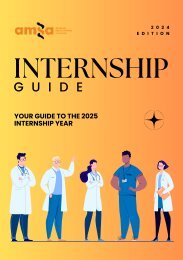AJGH Nexus - Volume 17 2023
AMSA Journal of Global Health (AJGH) 2023 Issue "Nexus"
AMSA Journal of Global Health (AJGH) 2023 Issue "Nexus"
You also want an ePaper? Increase the reach of your titles
YUMPU automatically turns print PDFs into web optimized ePapers that Google loves.
Several methods of improving community<br />
knowledge and practice of CPR in low- and<br />
middle-income settings have been proposed<br />
by various authors with each following a<br />
theme of community empowerment. Further<br />
public awareness and training should be<br />
bolstered in efforts to improve the areas of<br />
deficit best identified by the communities<br />
themselves. Moosajee US et al. (2018)<br />
recommends grassroots organisations such<br />
as high schools and religious congregations<br />
to facilitate CPR training with youth leaders<br />
and local medical students spearheading<br />
this.[2] Gross A (20<strong>17</strong>) suggested costeffective<br />
training where money and<br />
resources are limited is a strong<br />
consideration in determining training<br />
programs, with further recommendations<br />
including training Immediate Life Support<br />
(ILS) to provide interim first aid in critically<br />
unwell patients to prevent cardiac arrest.[6]<br />
As community training of CPR becomes a<br />
more clearly defined issue, international<br />
organisations such as the Philips<br />
Foundation’s educational outreach program<br />
and the International Red Cross Foundation’s<br />
Global First Aid are already working towards<br />
empowering communities to better respond<br />
to medical emergencies.[9] However, the<br />
broader ethical context must be considered.<br />
Large-scale organisations must prioritise<br />
delivering CPR training in an empowering<br />
and sustainable way. This means teaching<br />
local instructors to pass knowledge and<br />
training on to their communities.<br />
Furthermore, in-hospital factors should be<br />
optimised to improve rates of ROSC and STD<br />
in patients who suffer a cardiac arrest out of<br />
hospital, which is its own complex, locationspecific<br />
issue and requires far more funding,<br />
training, and resource provision particularly<br />
in the context of CPR training for medical<br />
professionals and students which provides<br />
certification, refresher training and is longterm,<br />
sustainable, and evidence-based.<br />
Putting the power of life-saving skills in the<br />
hands of community members is affording a<br />
bystander the chance to save a life. In lowand<br />
middle-income countries it is possible<br />
that bystanders will have the greatest<br />
opportunity to improve a patient’s outcome<br />
of cardiac arrest if they are equipped to<br />
deliver timely, effective CPR. CPR is a<br />
universal language but is sadly not<br />
universally accessible. There are programs<br />
already in place to address this, but there<br />
needs to be further research done to<br />
understand the quality of medical<br />
practitioner training of CPR and BLS. In a<br />
similar fashion to existing community-led<br />
initiatives, this research should inform local<br />
industry-led improvements. CPR is a<br />
universal language, and it must be a<br />
universal skill.<br />
About the Author<br />
Raffaela is a final year medical student<br />
from the University of Adelaide with<br />
keen interests in Paediatrics, Critical<br />
Care and Public Health. She is<br />
passionate about improving healthcare<br />
access for resource-poor communities.<br />
She has worked in remote Indigenous<br />
communities in an outreach capacity<br />
and overseas as a medical student in a<br />
low-income healthcare setting. This<br />
year, she was the Lead Policy Author<br />
for AMSA's Climate Change and Health<br />
Policy and a Policy Author for the<br />
Aboriginal and Torres Strait Islander<br />
Health Policy. She hopes to pursue<br />
further clinical roles in resource-poor<br />
settings and non-clinical roles focused<br />
on health systems management, policywriting,<br />
and leadership.<br />
Correspondence<br />
raff.letos@gmail.com

















